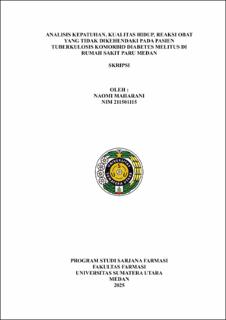Analisis Kepatuhan, Kualitas Hidup, dan Reaksi Obat yang Tidak Dikehendaki pada Pasien Tuberkulosis Komorbid Diabetes Melitus di Rumah Sakit Paru Medan
Analysis of Adherence, Quality of Life, and Adverse Drug Reactions in Patients Tuberculosis Comorbid Diabetes Mellitus at Pulmonary Hospital Medan

Date
2025Author
Maharani, Naomi
Advisor(s)
Khairunnisa
Tanjung, Hari Ronaldo
Metadata
Show full item recordAbstract
Background: Tuberculosis (TB) is an infectious disease that remains a global health problem, especially in patients with comorbid diabetes mellitus (DM). Indonesia is second highest number of TB cases in the world, while DM also continues to
increase in prevalence. TB patients with DM have a higher risk of complications, medication non-adherence, and adverse drug reactions (ADR), which in turn can affect their quality of life.
Objective: To determine the differences in respondent characteristics, differences and corelation of medication adherence to quality of life, as well as differences and
corelation of ADR to quality of life.
Methods: Quantitative research with a cross-sectional design was conducted at the Pulmonary Special Hospital Medan in the period November 2024-January 2025. Data were collected using a questionnaire that included information about the
respondent's identity, quality of life (EQ-5D-5L), medication non-adherence (MARS-5), and ADR as well as secondary data obtained from patient medical records and data analysis was carried out using descriptive test method.
Results: Of the 50 respondents who met the inclusion criteria, there was no significant difference between patient characteristics (gender, education level, occupation, length of illness) and quality of life (p> 0.05), but age showed a
significant difference (p = 0.014). The statistical result obtained is 0.004 (p < 0.05) that there is a significant difference between adherence and quality of life of
respondents and a weak positive relationship. In addition, adverse drug reactions in a number of patients did not have a significant difference on their quality of life at 0.111 (p > 0.05) with a moderate negative relationship.
Conclusion: Quality of life had significant differences in age characteristics, but not in other characteristics. Quality of life was influenced by medication adherence in a positive direction. ADR was not affected by quality of life in a negative direction. Therefore, increasing adherence and monitoring ADR are needed to improve the quality of life of patients with DM-TB at the Pulmonary Specialized Hospital in Medan.
Collections
- Undergraduate Theses [1833]
